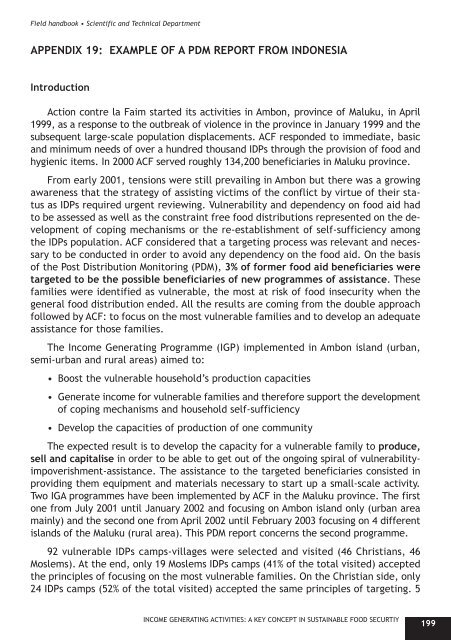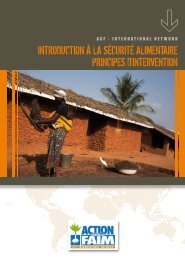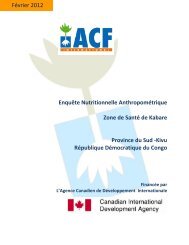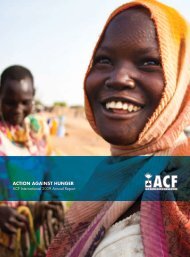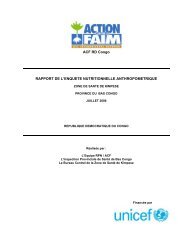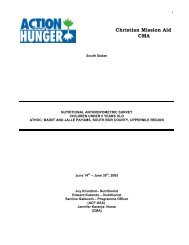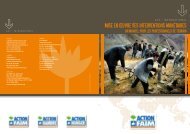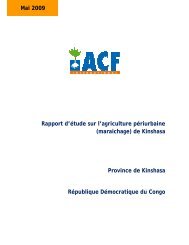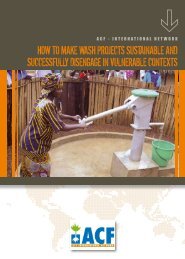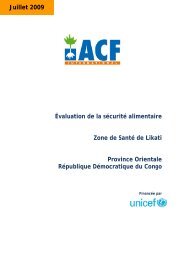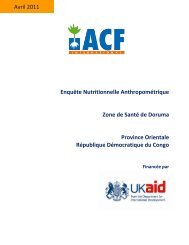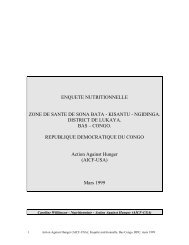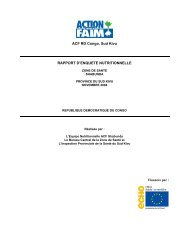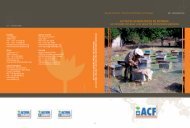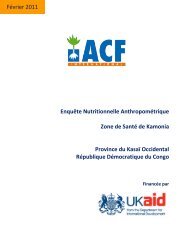Income-Generating Activities - Action Against Hunger
Income-Generating Activities - Action Against Hunger
Income-Generating Activities - Action Against Hunger
You also want an ePaper? Increase the reach of your titles
YUMPU automatically turns print PDFs into web optimized ePapers that Google loves.
Field handbook • Scientific and Technical Department<br />
APPENDIX 19: EXAMPLE OF A PDM REPORT FROM INDONESIA<br />
Introduction<br />
<strong>Action</strong> contre la Faim started its activities in Ambon, province of Maluku, in April<br />
1999, as a response to the outbreak of violence in the province in January 1999 and the<br />
subsequent large-scale population displacements. ACF responded to immediate, basic<br />
and minimum needs of over a hundred thousand IDPs through the provision of food and<br />
hygienic items. In 2000 ACF served roughly 134,200 beneficiaries in Maluku province.<br />
From early 2001, tensions were still prevailing in Ambon but there was a growing<br />
awareness that the strategy of assisting victims of the conflict by virtue of their status<br />
as IDPs required urgent reviewing. Vulnerability and dependency on food aid had<br />
to be assessed as well as the constraint free food distributions represented on the development<br />
of coping mechanisms or the re-establishment of self-sufficiency among<br />
the IDPs population. ACF considered that a targeting process was relevant and necessary<br />
to be conducted in order to avoid any dependency on the food aid. On the basis<br />
of the Post Distribution Monitoring (PDM), 3% of former food aid beneficiaries were<br />
targeted to be the possible beneficiaries of new programmes of assistance. These<br />
families were identified as vulnerable, the most at risk of food insecurity when the<br />
general food distribution ended. All the results are coming from the double approach<br />
followed by ACF: to focus on the most vulnerable families and to develop an adequate<br />
assistance for those families.<br />
The <strong>Income</strong> <strong>Generating</strong> Programme (IGP) implemented in Ambon island (urban,<br />
semi-urban and rural areas) aimed to:<br />
• Boost the vulnerable household’s production capacities<br />
• Generate income for vulnerable families and therefore support the development<br />
of coping mechanisms and household self-sufficiency<br />
• Develop the capacities of production of one community<br />
The expected result is to develop the capacity for a vulnerable family to produce,<br />
sell and capitalise in order to be able to get out of the ongoing spiral of vulnerabilityimpoverishment-assistance.<br />
The assistance to the targeted beneficiaries consisted in<br />
providing them equipment and materials necessary to start up a small-scale activity.<br />
Two IGA programmes have been implemented by ACF in the Maluku province. The first<br />
one from July 2001 until January 2002 and focusing on Ambon island only (urban area<br />
mainly) and the second one from April 2002 until February 2003 focusing on 4 different<br />
islands of the Maluku (rural area). This PDM report concerns the second programme.<br />
92 vulnerable IDPs camps-villages were selected and visited (46 Christians, 46<br />
Moslems). At the end, only 19 Moslems IDPs camps (41% of the total visited) accepted<br />
the principles of focusing on the most vulnerable families. On the Christian side, only<br />
24 IDPs camps (52% of the total visited) accepted the same principles of targeting. 5<br />
INCOME GENERATING ACTIVITIES: A KEY CONCEPT IN SUSTAINABLE FOOD SECURTIY<br />
199


